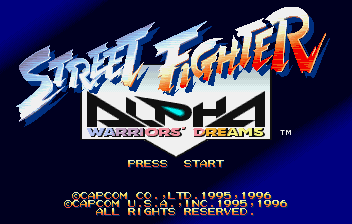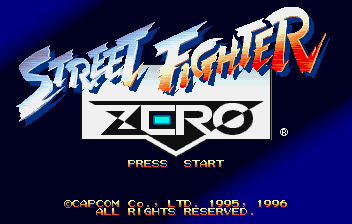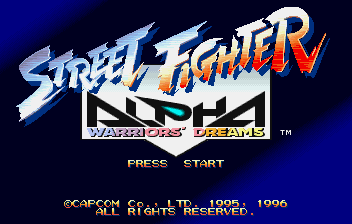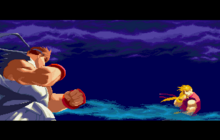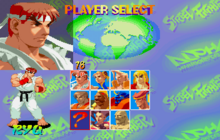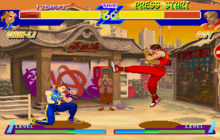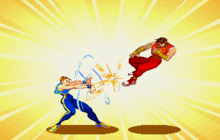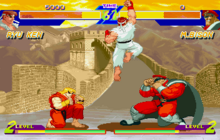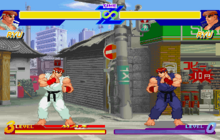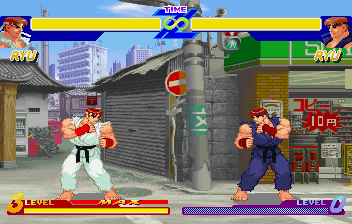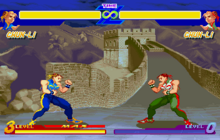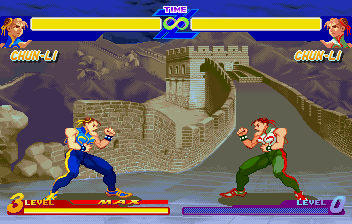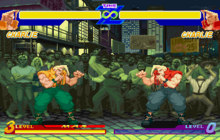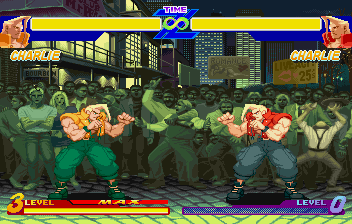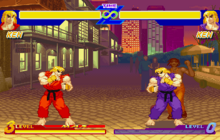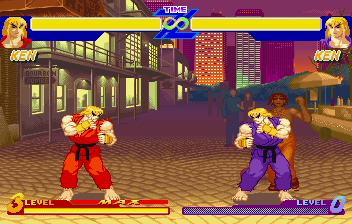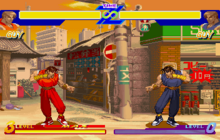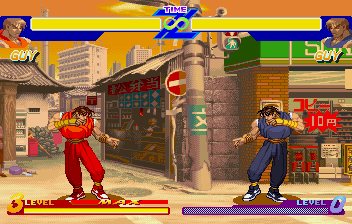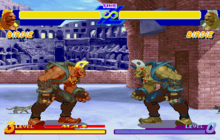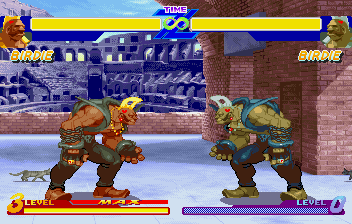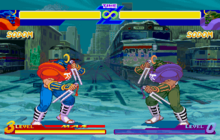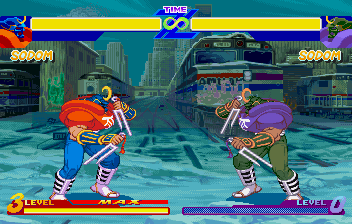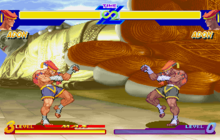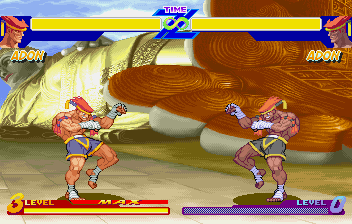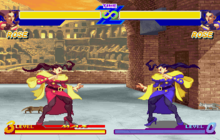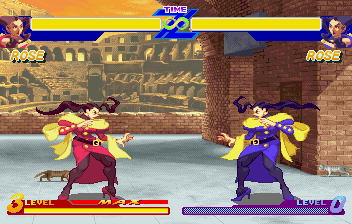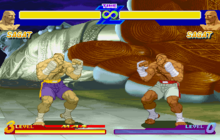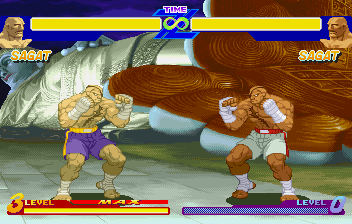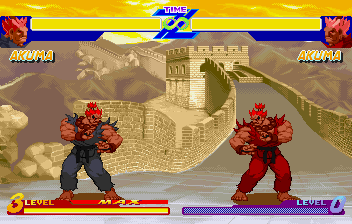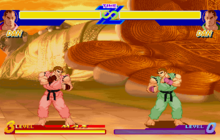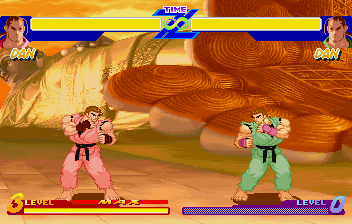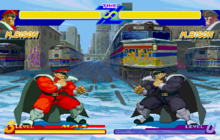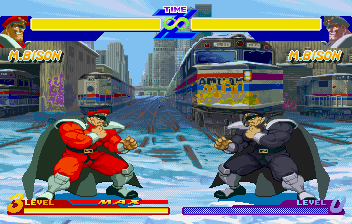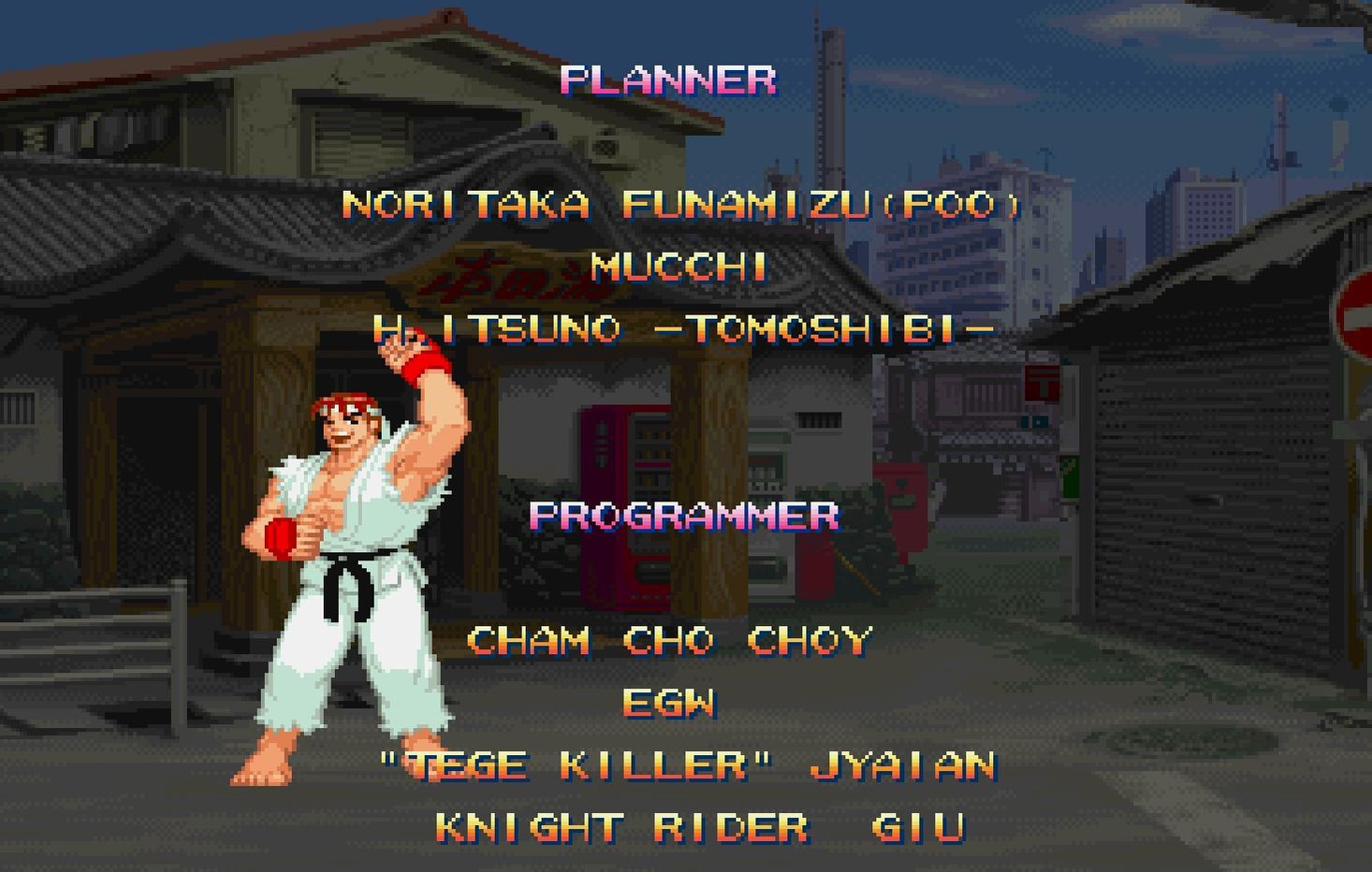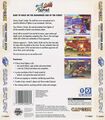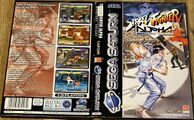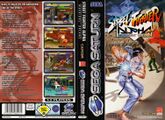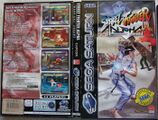Street Fighter Alpha: Warriors' Dreams
From Sega Retro
| ||||||||||||||||||||||||||||||||||||||||||||||||||
| Street Fighter Alpha: Warriors' Dreams | ||||||||||||||||||||||||||||||||||||||||||||||||||
|---|---|---|---|---|---|---|---|---|---|---|---|---|---|---|---|---|---|---|---|---|---|---|---|---|---|---|---|---|---|---|---|---|---|---|---|---|---|---|---|---|---|---|---|---|---|---|---|---|---|---|
| System(s): Sega Saturn | ||||||||||||||||||||||||||||||||||||||||||||||||||
| Publisher: Capcom (JP), Capcom Entertainment (US), Virgin Interactive Entertainment (Europe), Wooyoung System (KR) | ||||||||||||||||||||||||||||||||||||||||||||||||||
| Developer: Capcom | ||||||||||||||||||||||||||||||||||||||||||||||||||
| Distributor: Ecofilmes (PT), Sega-Ozisoft (AU), Tec Toy (BR) | ||||||||||||||||||||||||||||||||||||||||||||||||||
| Licensor: Capcom (US, EU), Capcom USA (US) | ||||||||||||||||||||||||||||||||||||||||||||||||||
| Original system(s): Capcom CPS-2 | ||||||||||||||||||||||||||||||||||||||||||||||||||
| Sound driver: SCSP/CD-DA (49 tracks) | ||||||||||||||||||||||||||||||||||||||||||||||||||
| Genre: Fighting, Action[1][2] | ||||||||||||||||||||||||||||||||||||||||||||||||||
| Number of players: 1-2 | ||||||||||||||||||||||||||||||||||||||||||||||||||
| ||||||||||||||||||||||||||||||||||||||||||||||||||
|
Street Fighter Alpha: Warriors' Dreams, known as Street Fighter Zero (ストリートファイターZERO) in Japan, is an entry to the Street Fighter series, developed and published by Capcom. The three entries in the Street Fighter Alpha series take place before the events of Street Fighter II but after the events of the original Street Fighter.
Contents
Story
The plot is set after the original Street Fighter but before Street Fighter II. Thus, the game features younger versions of established characters, as well as characters from the original Street Fighter and Final Fight (which was originally developed as a sequel to Street Fighter) and a few who are new to the series. Rather than a tournament bringing the characters together, the characters are on their own personal journeys that cross paths with each other.
Gameplay
The game is a one-on-one fighting game that evolves the gameplay from Super Street Fighter II Turbo. The game introduces several new features, with graphics drawn in a similar art style to Darkstalkers and X-Men: Children of the Atom.
Characters move with ![]() and
and ![]() and crouch with
and crouch with ![]() . They jump with
. They jump with ![]() and flip back and forth with
and flip back and forth with ![]() and
and ![]() . Punches are done with
. Punches are done with ![]() (jab),
(jab), ![]() (medium), and
(medium), and ![]() (fierce). Kicks are done with
(fierce). Kicks are done with ![]() (short),
(short), ![]() (medium), and
(medium), and ![]() (roundhouse). Light attacks are faster and hard attacks deal more damage. Special moves for each character are done by pairing specific directional combinations with an attack button. Characters can perform a taunt once per round with
(roundhouse). Light attacks are faster and hard attacks deal more damage. Special moves for each character are done by pairing specific directional combinations with an attack button. Characters can perform a taunt once per round with ![]() +
+![]() , which is a short animation during which the character is vulnerable to attack.
, which is a short animation during which the character is vulnerable to attack.
There is a new combo system called Chain Combos (Zero Combos in the Japanese version), which are combos that are performed by interrupting the animation of one basic move by performing another of equal or greater strength, similar to the system used in the Darkstalkers series. This is sometimes called a "magic series," since it follows a set order from lightest to hardest and from punches to kicks (light punch into light kick, medium punch into medium kick, then hard punch into hard kick), with some variation between characters.
Throws and grabs are done by holding ![]() or
or ![]() when next to an opponent and pressing a medium or hard punch or kick button. Different characters have different throws available to them, and some characters can throw in midair. Throws cannot be blocked, but a player can reduce the damage taken from a fall by likewise holding
when next to an opponent and pressing a medium or hard punch or kick button. Different characters have different throws available to them, and some characters can throw in midair. Throws cannot be blocked, but a player can reduce the damage taken from a fall by likewise holding ![]() or
or ![]() and pressing a medium or hard punch or kick button. It is also possible to roll on the ground after falling from a throw or other attack by pressing
and pressing a medium or hard punch or kick button. It is also possible to roll on the ground after falling from a throw or other attack by pressing ![]()
![]()
![]() P (or
P (or ![]()
![]()
![]() P if facing left).
P if facing left).
Blocking is done by holding the D-Pad away from the opponent. Characters can block while standing, which blocks against high and mid attacks but not low attacks (such as sweeps), or crouching, which blocks against mid and low attacks but not high attacks (such as jumping attacks and overhead strikes). Characters can also block in midair but cannot air block against normal attacks from an opponent that is standing on the ground and cannot air block after performing an attack in the air. Special moves still do a small amount of "chip damage" if blocked. Characters can become dizzy from being attacked repeatedly; they are uncontrollable and vulnerable in this state but can recover more quickly by rapidly pressing back and forth on the D-Pad along with the attack buttons. It is also possible to escape grabs in this way. In addition, characters can perform a special counterattacking technique called an Alpha Counter (Zero Counter in the Japanese version) after blocking an opponent's attack, which interrupts the blocked attack at the cost of a level of the Super Combo gauge.
The game expands the Super Combo system introduced in Super Street Fighter II Turbo with a three-level Super Combo gauge. Like in Super Turbo, the Super Combo gauge fills as the character performs regular and special techniques or takes damage. When the gauge reaches level 1 or higher, the player can perform a Super Combo technique, which is a more powerful version of a special attack, using a button combination that is slightly more complex than those used by special moves. The number of punch or kick buttons pressed simultaneously when performing a Super Combo determines the strength of the attack and thus the number of levels that are consumed, with higher levels hitting more times and doing more damage. Pressing ![]() is equivalent to pressing all three punch buttons simultaneously, and pressing
is equivalent to pressing all three punch buttons simultaneously, and pressing ![]() is equivalent to pressing all three kick buttons simultaneously. The Super Combo gauge carries over between rounds (but not between battles).
is equivalent to pressing all three kick buttons simultaneously. The Super Combo gauge carries over between rounds (but not between battles).
Modes
The single-player mode consists of seven random computer-controlled opponents and a final opponent whose identity depends on the storyline of the player's selected character. M. Bison is the final boss for half of the characters. There are also two hidden characters: Akuma, who returns from Super Street Fighter II Turbo as an alternate final boss only after certain in-game requirements are met, and a new character named Dan, who challenges the player during the course of the game if certain requirements are met. The game ends if the player loses a match but can be continued an unlimited number of times. A second player can join the game to challenge the other player to a fight by pressing START , with the victor continuing in the tournament. There are eight difficulty levels for computer-controlled opponents.
The console ports added an optional arranged soundtrack, a dedicated two-player Versus Mode (where two players can fight each other), and a Training Mode (where a single player can practice against a non-hostile character). The game saves high scores to the console's internal memory.
The game also features a secret two-on-one "Dramatic Battle" in which two players can fight against a computer-controlled M. Bison as Ryu and Ken (mirroring the climactic final battle in Street Fighter II: The Animated Movie).
There are two playing styles that can be selected after choosing a character: Normal and Auto. Auto differs from Normal in that the character automatically guards against a limited number of attacks (provided the character is not in the middle of performing an attack). Auto also allows the player to perform an instant Super Combo by pressing a punch and kick button of the same strength simultaneously, but at the expense of reducing the maximum level of the Super Combo gauge to one.
Characters
Note: Move lists assume that the character is facing right. When facing left, ![]() and
and ![]() should be reversed.
should be reversed.
| P | Any punch button |
| LP | Light punch |
| MP | Medium punch |
| HP | Hard punch |
| K | Any kick button |
| LK | Light kick |
| MK | Medium kick |
| HK | Hard kick |
Playable
Ryu, Ken, Chun-Li, and Sagat return from Street Fighter II, along with Birdie and Adon (Sagat's former apprentice) from the original Street Fighter, who make their first appearances as playable characters. Guy, one of the main playable characters from Final Fight, appears along with Sodom, a boss character from the same game. New to the series are Charlie, Guile's combat buddy who fights with similar techniques, and Rose, an Italian fortune teller who uses an energy known as "Soul Power."
Originally appeared in: Street Fighter
Final battle: Sagat
|
Ryu | |||||||||||||||||
| The rumors of a fighter with a mysterious power shook Ryu's heart. Armed with the Hadouken and the Shouryuuken that scarred Sagat, Ryu's heart beats faster as he reaches new heights. | ||||||||||||||||||
Originally appeared in: Street Fighter II
Final battle: M. Bison
|
Chun-Li | |||||||||||||||||
| Haunted by the unsolved disappearance of her father, Chun-Li became a detective to find out what happened with her own eyes. The existence of a certain drug syndicate might hold a clue to her father's whereabouts. | ||||||||||||||||||
Originally appeared in: Street Fighter Alpha
Final battle: M. Bison
|
Charlie (Nash) | |||||||||||||||||
| A soldier who is conducting an undercover investigation by himself after receiving intelligence that members of the military's top brass are under the payroll of a certain drug syndicate. Charlie seeks to bring those who have sold their souls to the devil to justice. | ||||||||||||||||||
Originally appeared in: Street Fighter
Final battle: Ryu
|
Ken | |||||||||||||||||
| Ken has been training by himself until hearing tales of Ryu's exploits. Learning that his former training partner has defeated Sagat, Ken seeks to test his strength one more time in order to not be outdone. | ||||||||||||||||||
Originally appeared in: Final Fight
Final battle: M. Bison
|
Guy | |||||||||||||||||
After the Metro City incident, Guy felt he made little progress in his Bushin-ryuu training. While his style excelled in martial sports, it had no role in actual combat. Guy now travels the world seeking opponents to fight in order to experience true combative ninjutsu.
| ||||||||||||||||||
Originally appeared in: Street Fighter
Final battle: M. Bison
|
Birdie | |||||||||||||||||
Birdie was banned from competing in martial arts tournaments due to his ferocious temper and illegal techniques and has been working as a bouncer since then. But when he hears rumors of a criminal organization seeking to recruit strong men, he quits his job in order to show his true strength to the world.
| ||||||||||||||||||
Originally appeared in: Final Fight
Final battle: Guy
|
Sodom | |||||||||||||||||
| To comprehend the ultimate Japanese martial arts, Sodom has achieved the first step of his grand ambition. Having gained a certain feeling from his training in Japan, Sodom now pursues a lonely battle seeking strong allies in order to revive the Mad Gear Gang. | ||||||||||||||||||
Originally appeared in: Street Fighter
Final battle: Sagat
|
Adon | |||||||||||||||||
Sagat's loss in the tournament brought up a great sense of disappointment in Adon. There is no reason for someone who has truly mastered the ways of Muay Thai to lose to anyone. In order to truly become a god of the fighting world, Adon gives Sagat, who has defiled the holy strength of Muay Thai, his last rites.
| ||||||||||||||||||
Originally appeared in: Street Fighter Alpha
Final battle: M. Bison
|
Rose | |||||||||||||||||
Rose trembled as she sensed a nearby power. Her Soul Power reacted to an evil presence who also controls spiritual energy. She now must seek the source of this calamity and seal its power. This is a final mission she has been burdened to complete.
| ||||||||||||||||||
Originally appeared in: Street Fighter
Final battle: Ryu
|
Sagat | |||||||||||||||||
| He was once known as the Emperor of Muay Thai until he was defeated by an unknown Eastern fighter with a single blow. Overcome with a sense of defeat and disgrace that he never felt before, Sagat stands up to reclaim his throne. |
Hidden
- Main article: Street Fighter Alpha: Warriors' Dreams/Hidden content.
In addition to the ten regular characters, there are also three hidden characters, selectable only by inputting cheat codes. M. Bison appears as the final boss for certain characters, while Akuma, returning from his appearance as a hidden boss character in Super Street Fighter II Turbo, and Dan, a parody of Ryo Sakazaki and Robert Garcia from the Art of Fighting series by SNK, can be fought by fulfilling certain conditions.
Stages
Each character has his or her own stage where matches are hosted in single-player games. The stage can be manually chosen in the two-player mode.
There are only six unique stage backdrops, with every backdrop reused at least once (but with unique variations for each character).
History
Development
The working titles for the game were Street Fighter Classic and Street Fighter Legends. The development team was only given a three-month deadline, which ended up being extended to six months.[10] Because of the rushed development process, the game has some incomplete aspects, such as only including six unique stage backdrops.
Legacy
The game was followed by Street Fighter Alpha 2, also ported to the Saturn in 1996, and Street Fighter Alpha 3, ported to the Saturn in 1999 and to the Dreamcast in 2000.
Versions
The original arcade game was developed for Capcom's CPS-2 arcade board. A slightly downgraded version was also released for their older CPS-1 board. The Saturn port is faithful to the arcade version. The main difference is the video mode, which is 384x224 in the arcade version but 352x224 in the Saturn version. Because of this, some sprites (notably the characters) appear slightly wider. Also, because of memory constraints, some frames of animation had to be removed from the home ports. Both home ports have a new arranged soundtrack (with the original soundtrack still available as an option), along with extra modes.
Localised names
| Language | Localised Name | English Translation |
|---|---|---|
| English | Street Fighter Alpha: Warriors' Dreams | Street Fighter Alpha: Warriors' Dreams |
| English (US) | Street Fighter Alpha: Warriors' Dreams | Street Fighter Alpha: Warriors' Dreams |
| Japanese | ストリートファイターZERO | Street Fighter Zero |
Production credits
- Planner: Noritaka Funamizu (POO), Mucchi, H.Itsuno -Tomoshibi-
- Programmer: Cham Cho Choy, EGW, "Tege Killer" Jyaian, Knight Rider Giu, CGT_DM, PON, Arikichi, Hard.Yas -Gouki-, Hamachan, Hyper Shinchan, Super "Vega" Sailor, Matsushita -Adon- Masakazu
- Scroll Design: Konomi, Buppo, Kayoko Shibata, Akiko Matsunaga, Daisuke Nakagawa, Megumi Maeno, Isono, SM, Mago, Mr.Oranda
- Object Design: "Dokkim"Eripyon, Yatsunonawa"D", Jun Matsumura 27, Makoto Ishii Chama(C), Gonta, Ari Inukichi, Seigo"Ushi"Kawakami, M."Kotatutoneko"Nakatani, Alien Pole, Kuriotoko, Chimorin Syogun, Takechan, Masaaki, Dway Nishimura, Norihide = Fnyako.F, Shin-Ya.M, Super-8, "Noriko"M.Tsujimoto, R, Sagata, Takayuki Kosaka
- Music compose: Abe "Oyaji" Isao, Syun "Kobekko" Nishigaki, Yamamoto "Purple" Setsuo, Kadota "Pop'N" Yuko, Kuru-Kuru Chance Iwami, Mizuta "Groovy" Naoshi
- Sound design: Hiroaki "X68K" Kondo, Ryoji
- Voice Actor: Tomomichi Nishimura, Toshiyuki Morikawa, Wataru Takagi, Tetsuya Iwanaga, Yuko Miyamura, Shinichiro Miki
- Producer: Iyono Pon
- Special Thanks: Takuya Shiraiwa, Hattari, Capcom All Staff
- Consumer Staff: T.Fujiwara, M.Akahori, Hisashi Kuramoto, Kazuhiro Tsuchiya, Hiroaki Matsumoto, Yasuhiro Yanagi, Takayuki Umezu, Yasuhito Okada, Masaki Kataoka, Taro Takeda, Tatsuji Yataka, Atsushi Manobe, Hideki Tada, Takashi Nao, Hiroaki Watanabe, S.Ikuta, Shimitan, M.Sakano, H.Ando, Hiroki Bandoh, Y.Kawano, S.Murata, Y.Kanemori, M.Yasuma, H.Kaji, T.Yoshikawa, H.Katagiri, K.Toda, C.Ryugo, S.Okamura
- Sound design: Toshio"T.Kjn"Kajino (1970.2.25.B), More Rich, DJ★Wada Hiroyuki, Tomoyuki"T.K,Ny"Kawakami, Command+Z"Mac", Shinji"Amayan"Amagishi
- Music compose: Mizuta "Groovy" Naoshi, Kuru-Kuru Chance Iwami, Akari.K -Lemon-
- Guitars & Acoustic Piano: Masato Kohda
- Presented by: Capcom
Magazine articles
- Main article: Street Fighter Alpha: Warriors' Dreams/Magazine articles.
Promotional material
Artwork
Physical scans
| ExpandSega Retro Average |
|---|
| 89 | |
|---|---|
| Based on 30 reviews | |
| Saturn, KR |
|---|
|
Technical information
- Main article: Street Fighter Alpha: Warriors' Dreams/Technical information.
External links
- Sega of America webpage: Saturn
References
- ↑ File:SFA Saturn JP Box Back.jpg
- ↑ Jump up to: 2.0 2.1 https://sega.jp/fb/segahard/ss/soft_licensee2.html (Wayback Machine: 2020-03-20 23:05)
- ↑ https://groups.google.com/g/rec.games.video.sega/c/6FKYYVSQAGE/m/XCrYEkyY2w0J
- ↑ https://groups.google.com/g/rec.games.video.sega/c/QEJfyZmRM3A/m/1yf-YQPuNNMJ
- ↑ https://groups.google.com/g/rec.games.video.sega/c/pN77cESHcUg/m/mR50tcI-8c4J
- ↑ Computer Trade Weekly, "" (UK; 1996-05-20), page 17
- ↑ Jump up to: 7.0 7.1 Computer & Video Games, "April 1996" (UK; 1996-03-14), page 34
- ↑ Jump up to: 8.0 8.1 Sega Saturn Magazine, "April 1996" (UK; 1996-03-23), page 74
- ↑ Jump up to: 9.0 9.1 http://www.tectoy.com.br/releases/index.htm (Wayback Machine: 1998-06-25 19:48)
- ↑ https://www.polygon.com/2020/11/23/21579064/street-fighter-alpha-an-oral-history
- ↑ File:SFZ Saturn JP SSEnding.pdf
- ↑ Game Champ, "xxxx" (KR; 199x-xx-xx), page 6
- ↑ Game Champ, "xxxx" (KR; 199x-xx-xx), page 16
- ↑ 576 KByte, "Július-Augusztus 1996" (HU; 1996-xx-xx), page 11
- ↑ Consoles +, "Mai 1996" (FR; 1996-0x-xx), page 91
- ↑ Famitsu, "1996-02-02" (JP; 1996-01-19), page 1
- ↑ Freak, "3/96" (IL; 1996-xx-xx), page 1
- ↑ Fun Generation, "05/96" (DE; 1996-04-10), page 58
- ↑ Gambler, "9/1996" (PL; 1996-xx-xx), page 1
- ↑ GameFan, "Volume 4, Issue 3: March 1996" (US; 1996-xx-xx), page 13
- ↑ GamePro, "April 1996" (US; 1996-xx-xx), page 76
- ↑ Game Informer, "March 1996" (US; 1996-0x-xx), page 50
- ↑ Joypad, "Mars 1996 (Joypad International supplement)" (FR; 1996-0x-xx), page 23
- ↑ Joypad, "Mai 1996" (FR; 1996-0x-xx), page 59
- ↑ MAN!AC, "03/96" (DE; 1996-02-14), page 40
- ↑ MAN!AC, "07/96" (DE; 1996-06-12), page 68
- ↑ Maximum, "March 1996" (UK; 1996-03-29), page 146
- ↑ Mega Force, "Mai 1996" (FR; 1996-0x-xx), page 34
- ↑ Mega Fun, "04/96" (DE; 1996-03-20), page 70
- ↑ Mean Machines Sega, "May 1996" (UK; 1996-04-04), page 74
- ↑ Player One, "Mai 1996" (FR; 1996-0x-xx), page 86
- ↑ Saturn Fan, "1996 No. 6" (JP; 1996-03-01), page 120
- ↑ Saturn+, "Easter/April 1996" (UK; 1996-03-07), page 40
- ↑ Sega Magazin, "April 1996" (DE; 1996-03-13), page 68
- ↑ Sega Power, "June 1996" (UK; 1996-04-11), page 48
- ↑ Sega Pro, "September 1996" (UK; 1996-07-xx), page 26
- ↑ Sega Saturn Magazine, "1996-02 (1996-02-09)" (JP; 1996-01-26), page 235
- ↑ Sega Saturn Magazine, "Readers rating final data" (JP; 2000-03), page 12
- ↑ Total Saturn, "Volume One Issue Four" (UK; 1996-12-29), page 53
- ↑ Ultimate Future Games, "May 1996" (UK; 1996-03-29), page 58
- ↑ Video Games, "4/96" (DE; 1996-03-20), page 88
| CollapseStreet Fighter Alpha: Warriors' Dreams | |
|---|---|
|
Main page | Comparisons | Hidden content | Magazine articles | Video coverage | Reception | Technical information
| |
| CollapseStreet Fighter games for Sega systems | |
|---|---|
| Street Fighter II': Champion Edition (unreleased) | Street Fighter II': Special Champion Edition (1993) | Super Street Fighter II: The New Challengers (1994) | |
| Street Fighter: The Movie (1995) | Street Fighter Alpha: Warriors' Dreams (1996) | Street Fighter II Movie (1996) | Street Fighter Alpha 2 (Dash) (1996) | Super Puzzle Fighter II Turbo (1996) | Street Fighter Collection (1997) | X-Men vs. Street Fighter (1997) | Pocket Fighter (1998) | Marvel Super Heroes vs. Street Fighter (1998) | Capcom Generation: Dai 5 Shuu Kakutouka-tachi (1998) | Street Fighter Zero 3 (1999) | |
| Street Fighter II' (1997) | |
| Street Fighter Alpha 3 (1999) | Street Fighter III: Double Impact (1999) | Street Fighter III: 3rd Strike (2000) | Super Street Fighter II X for Matching Service (2000) | Street Fighter Zero 3 for Matching Service (2001) | Super Puzzle Fighter II X for Matching Service (2001) | |
| Street Fighter Zero 3 Upper (2001) | |
| Sampler discs | |
| Street Fighter Zero 2 Taikenban (199x) | Street Fighter Collection Taikenban (1997) | |
| Street Fighter Zero 3 Tentou Taikenban (199x) | |
| Unlicensed Street Fighter games for Sega systems | |
| Jang Pung II (1993) | |
| X-Men vs. Street Fighter (Mega Drive) (1998) | |
| CollapseFinal Fight games for Sega systems | |
|---|---|
| Final Fight CD (1993) | |
| Final Fight Revenge (1999) | |
| Related games | |
| Saturday Night Slam Masters (1994) | |
| Street Fighter Alpha: Warriors' Dreams (1996) | Street Fighter Alpha 2 (Dash) (1996) | Street Fighter Collection (1997) | Street Fighter Zero 3 (1999) | |
| Street Fighter Alpha 3 (1999) | |
- 1-2 player games
- JP Saturn games
- All JP games
- US Saturn games
- All US games
- EU Saturn games
- All EU games
- DE Saturn games
- All DE games
- PT Saturn games
- All PT games
- UK Saturn games
- All UK games
- PL Saturn games
- All PL games
- AU Saturn games
- All AU games
- BR Saturn games
- All BR games
- Saturn games
- 1996 Saturn games
- All 1996 games
- Saturn fighting games
- All fighting games
- Saturn games with QSound support
- All games
- Old-style rating (gamesmaster)
- Rating without PDF source
- Update ratings template
- 1 old ratings
- Street Fighter Alpha: Warriors' Dreams
- Street Fighter
- Final Fight (franchise)
